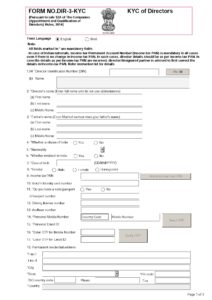Reporting of Fraud and Other Matters by Auditor, Cost Auditor and Secretarial Auditor
#1: Amount of Fraud is more than One Crore Rupees and Above :
If an auditor of a company, in the course of the performance of his duties as statutory auditor, has reason to believe that an offence of fraud, which involves or is expected to involve individually an amount of rupees one crore or above, is being or has been committed against the company by its officers or employees, the auditor shall report the matter to the Central Government.
- Manner of Reporting of Fraud to Central Government:
The auditor shall report the matter to the Central Government as under:-
(a) the auditor shall report the matter to the Board or the Audit Committee, as the case may be, immediately but not later than two days of his knowledge of the fraud, seeking their reply or observations within forty-five days;
(b) on receipt of such reply or observations, the auditor shall forward his report and the reply or observations of the Board or the Audit Committee along with his comments (on such reply or observations of the Board or the Audit Committee) to the Central Government within fifteen days from the date of receipt of such reply or observations;
(c) in case the auditor fails to get any reply or observations from the Board or the Audit Committee within the stipulated period of forty-five days, he shall forward his report to the Central Government along with a note containing the details of his report that was earlier forwarded to the Board or the Audit Committee for which he has not received any reply or observations;
- Where Report of Fraud is required to be sent :
(d) the report shall be sent to the Secretary, Ministry of Corporate Affairs in a sealed cover by Registered Post with Acknowledgement Due or by Speed Post followed by an e-mail in confirmation of the same;
(e) the report shall be on the letter-head of the auditor containing postal address, e-mail address and contact telephone number or mobile number and be signed by the auditor with his seal and shall indicate his Membership Number; and
(f) The report shall be in the form of a statement as specified in Form ADT-4.
#2: Amount of Fraud is less than One Crore Rupees :
In case of a fraud involving lesser than the Rs.1 Crore, the auditor shall report the matter to Audit Committee constituted under section 177 of the Companies Act, 2013 or to the Board immediately but not later than two days of his knowledge of the fraud and he shall report the matter specifying the following:-
(a) Nature of Fraud with description;
(b) Approximate amount involved; and
(c) Parties involved.
Disclouser of Fraud in Board Report :
The following details of each of the fraud reported to the Audit Committee or the Board under sub-rule (3) during the year shall be disclosed in the Board’s Report:-
(a) Nature of Fraud with description;
(b) Approximate Amount involved;
(c) Parties involved, if remedial action not taken; and
(d) Remedial actions taken.
The provision of this rule shall also apply, mutatis mutandis, to a Cost Auditor and a Secretarial Auditor during the performance of his duties under section 148and section 204 respectively.










